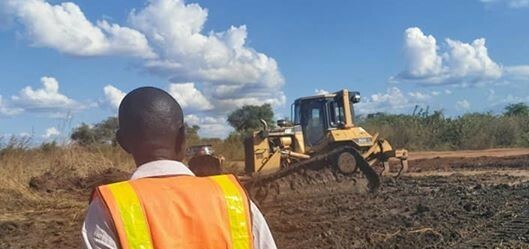Citizens in Eastern Equatoria State are voicing their disappointment after learning that the construction of the Juba-Nadapal highway has suddenly ceased due to a lack of funding.
Last week, Jildo Abala Remy, the Minister for Roads and Bridges in South Sudan’s Eastern Equatoria State, announced that the construction of the Juba-Nesitu-Torit-Kapoeta and Nadapal highway had abruptly stopped due to insufficient funds.
In August 2020, construction crews began clearing trees along the route in preparation for full-scale construction, which was expected to commence after the completion of initial work, including bush clearing. The 365-kilometre road passes through Torit, Kapoeta, and Nadapal at the border with Kenya, and the project was undertaken by WINNER’S Construction Company Limited, a South Sudanese road construction company.
Originally scheduled to be completed within four years, officials now attribute the halt in construction to a lack of funds.
Speaking to Radio Tamazuj on Friday, several citizens of Eastern Equatoria questioned the government as to why some roads in the country, such as the Juba-Bor and Juba-Bahr el Ghazel roads, have received sufficient funding and construction in ongoing, while the highway project in Eastern Equatoria State has been halted.
“We are deeply disappointed because we were previously informed that this road would be completed within two years. However, we now see that the construction of this road from Juba to Torit has come to a standstill. This situation has not occurred with other national road projects in the country. We observe that the Juba-Bor road has already been surfaced, and another road from Juba to Terekeka and beyond has also been paved,” said Torit resident Aliandro Lotok.
Lotok raised doubts about the reasons behind the suspension of the road project in Eastern Equatoria State, stating, “It appears that funds may have been redirected to complete other road projects first. I am displeased with this situation and call upon our representatives in the national parliament to inquire why the road project in Eastern Equatoria State has suddenly come to a stop. We need transparency regarding this matter. Furthermore, I believe the Juba-Nesitu-Torit-Kapoeta-Nadapal road is more essential than the Juba-Nimule road because it is a direct route and shorter.”
Susan Ikolok, another citizen, expressed her discontent, saying, “We are extremely dissatisfied as the construction of our road from Juba to Kenya, passing through Torit, has been halted. This is not the first time such a situation has occurred. Several organizations have previously attempted to construct this road but suddenly ceased their efforts. Unfortunately, it seems to be happening for the third time.”
Ikolok added, “We are unsure about the reasons behind these recurring setbacks. We demand that our road be constructed to the same standard as roads in other regions, allowing vehicles to travel from Kenya to Torit and Juba directly, rather than taking detours through Uganda, which significantly delays the journey. This division created by the government saddens us as citizens. The government of South Sudan should work united as one entity. The road construction should not have been abandoned halfway. It must be completed, and the companies involved should be called upon to finish the project once and for all.”
Utong James, a resident of Lafon, urged Governor Louis Lobong Lojore to raise the issue at the national level to ensure the provision of services through the road.
“We expect this road to benefit everyone, both citizens and the government. It is a road that generates revenue for Eastern Equatoria State, facilitating our development. If the government neglects this road, it signifies a failure in our state’s progress,” emphasized Utong.
Charles Okullu Cypriano, an activist and development expert, accused the government of withholding information from its citizens and stressed the need for clarification to understand the cause of this predicament.
Okullu remarked, “The key lies in effective planning. You must establish your future intentions, formulate comprehensive plans, and engage with relevant institutions or companies capable of executing the project. This ensures a strong working relationship and maximizes the chances of success before any physical work begins. You cannot initiate a project, for instance, a road that costs 10 million USD, when you have only allocated 2 million USD for it. You need to secure the entire budget before commencing work.”
He further questioned the South Sudan government, saying, “You cannot skip the planning stage. Resources must align with the established plan, including finances, human resources, and other necessary elements, to ensure a smooth and successful process. We were under the impression that all resources were made available during the design phase, with allocations finalized. So, are you now telling us that you neglected the project planning stage?”
Okullu proposed, “Let us assume that you neglected a particular stage, perhaps the design or resource acquisition phase. However, we do not want to assume; instead, we urge you to be forthright and inform us. Be bold enough to reveal any budget reallocations so that we can be aware of the situation.”




